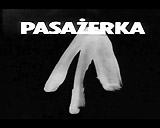
|
Passenger (1963, Poland) (aka Pasażerka)
In director Andrzej Munk's unfinished and incomplete
documentary and Holocaust war drama, only about an hour long, using
only still photographic images in the unshot scenes - assembled by
the director's assistant Witold Lesiewicz:
- the opening explanatory montage of still shots of
director Munk (he died in a car accident in 1961 before the film
was completed), with voice-over commentary providing an overview
of the film's making and production as a renovated salvage job:
("...We have no intention of adding what he had no time to
say himself. We are not searching for solutions which might not
have been his, nor seeking to conclude the plots which his death
left unresolved. We merely wish to present what was filmed with
all the gaps and reticence, in an attempt to grasp whatever is
alive and significant. Andrzej Munk was our contemporary. We shared
his hopes and fears, and while not anticipating the answers, we
may perhaps manage to present questions that he wished to pose")
- the main fragmented plot: on a trans-Atlantic journey
home to Germany after many years, Liza (Aleksandra Slaska) - a former
Auschwitz SS officer-guard, spotted a person she thought resembled
someone she used to know -- Marta (Anna Ciepielewska) - a Polish
woman and former Jewish POW inmate; Marta was seen by Liza from the
ship's deck, boarding the luxury passenger ship's gangplank (all
of the scenes on the ship's deck were still images); the sight of
Marta triggered her long-forgotten memories ("What has Liza
seen? Her husband does not understand why this encounter has upset
her"), structured in a series of three flashbacks (moving images)
- each one revealing a deeper and more complex view of Liza's past
- after spotting Marta, Liza closed her eyes and the
image flared to bright white - and the beginning of the first of
the film's three flashbacks; there was a brief tour (with short recreated
or re-enacted scenes) of the death camp of Auschwitz, including naked
females at daytime enclosed in a circle and forced to run through
a gauntlet of dogs and guards, scenes of death and hard labor, and
the sight of the tattooing of a prisoner's arm

|
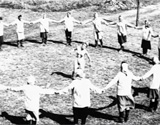
|

|
|
Liza's Closed Eyes
|
Females in Circle
|
Tattooing of Prisoner's Arm
|
- distressed by the memory, Liza spoke to her husband
Walter (Jan Kreczmar): ("Don't call me 'poor little thing.'
You know nothing about it. My time in the camp was not what you
think, my dear Walter. I wasn't a prisoner, I was an overseer.
Don't look at me like that. I didn't hurt anyone. And if Marta
is alive, it's only because of me. I haven't told you much about
my past. You were an emigrant. You'll never understand how we had
to live and obey our leaders. Perhaps it's best for us both if
you hear it at last...")
- Liza offered a confessional voice-over to her husband
during a second longer flashback - a self-justifying, redemptive,
mostly sanitized and distorted version of her Auschwitz experience;
there were more images of the camp - confiscated or left-behind possessions
and trunks next to the train tracks, a lengthy tracking shot of the
camp's barbed wire perimeter, the outside of the camp's brick buildings
(with a view up to a crematory chimney with black smoke pouring out),
the interior of a storehouse of inmates' discarded clothes, rows
of grim-looking female inmates in muddy striped uniforms, and some
examples of the brutalities suffered by the prisoners (often seen
at the perimeter of the images)
- Liza's second version of events at Auschwitz
was also told - an interior monologue that marked the film's third
and longest flashback - with the real subjective and emotionally-honest
'truth' of what had happened, when she supervised workers in the
warehouse of confiscated goods; the vindictive and brutal Liza struggled
to gain mastery and control over Marta and her attempted love affair
with fellow prisoner Tadeusz (Marek Walczewski)
- included in her lengthy remembrances were more arrivals
(of families and children being led to their deaths in an underground
bunker), the many executions (hangings), gassings, crematory burnings,
the immense piles of prisoner's possessions - including many baby
carriages, vicious dog attacks in the mud, and a night-time 'game'
when naked female Holocaust prisoners were forced to run between
a gauntlet of dogs and guards
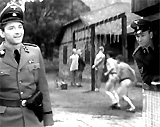
|
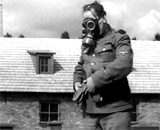
|

|
|
Hangings
|
Gas Masks Worn During Gassings
|
Vicious Dog Attacks
|
- the indeterminate and unfinished ending - was the
passenger actually Marta? - however, it was made explicit that
Liza's Nazi guilt, crimes and complicit self-justifications had
followed her into the present day: ("The brush with the past
did not last long. Marta, or someone resembling her, disembarked
at the next port of call. The ship sails on. It's doubtful if the
women will ever meet again. Liza won't be challenged by truths
buried in the mud of Auschwitz. Nothing can disturb Liza's life
among people indifferent to yesterday's crimes, who even today...")

|
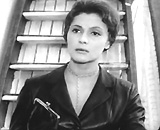
|

|
|
Marta in Death Camp
|
Marta (?) Disembarking From Ship
|
|

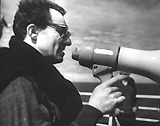
Film Director Andrzej Munk
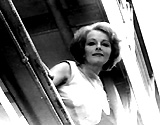
Liza - Spotting Marta From Ship's Deck

Sight of Marta Boarding Ship

Liza's Memories of Death Camp
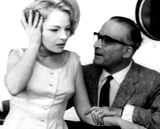
Liza's Confessional to Her Husband
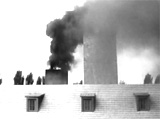
Crematory Chimney

Female Inmates in Muddy Uniforms

Naked Women Running Through Gauntlet
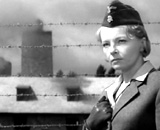
Liza As SS Officer/Prison Supervisor in Death Camp
|











